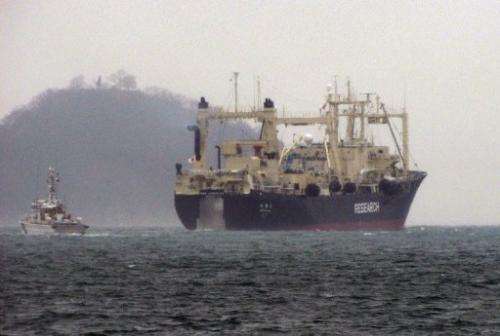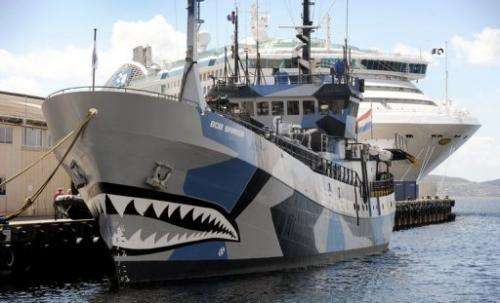Activists confront Japanese over whale kill

Militant environmentalists Monday accused Japanese whalers of attempting to crash into their ship as they tried to prevent harpoonists from hauling a slaughtered whale on board.
The Sea Shepherd Conservation Society, which is chasing the Japanese fleet hunting whales off Antarctica, said the confrontation occurred after its Bob Barker vessel attempted to block the transfer of a dead whale.
"We blocked it for nine attempts but then their harpoon ship attempted to try and come across and hit us so we ducked away and that's when they were able to make the transfer of that whale," Sea Shepherd Australia's Jeff Hansen said.
Hansen said the confrontation, which he said took place "well and truly" inside Australian Antarctic waters, lasted several hours as he called on Canberra to intervene.
"Is this Australian territory or not? If it is, then come down and exert some kind of authority," Hansen said.
"In the past there were Patagonian toothfish operators down there, illegal poachers from Uruguay, the Customs vessel chased them all over the Southern Ocean, arrested them and confiscated their vessel."

Sea Shepherd also said the Japanese fleet's fuel tanker, the Sun Laurel, had been followed by the activists' SSS Sam Simon and had spilled oil into the pristine waters.
"The crew smelled diesel fuel, they stopped and collected samples; it was diesel on the water," Sea Shepherd founder Paul Watson told Sky News.
"The rules say that you can't drop any amount of fuel into the Antarctic territory. And you are especially not allowed to drop fuel that is a cargo fuel and this is a cargo fuel that they are dropping."
Environment Minister Tony Burke has described Japan's whale hunt as cruel and unnecessary but on the weekend said the government would not send a boat to "watch and do nothing".
"We condemn the activity Japan is involved with and while it is worse within a whale sanctuary that doesn't mean it is acceptable anywhere," he said on Saturday.
"It doesn't matter where it occurs, whaling is not necessary, it is cruel and it has nothing to do with science."
Australia is strongly opposed to whaling and launched legal action challenging the basis of Japan's so-called "scientific" hunt in December 2010.
Earlier this month Canberra lodged a protest with Tokyo after part of the Japanese whaling fleet entered Australia's exclusive economic zone in the Southern Ocean near Macquarie Island.
Japan claims it conducts vital scientific research using a loophole in an international ban on whaling, but makes no secret of the fact that the animals ultimately end up on dinner plates.
(c) 2013 AFP





















